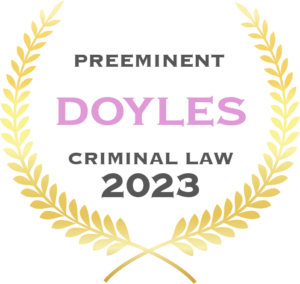In light of the COVID-19 pandemic, several amendments have been made to NSW Laws. These include on the spot fines for non-compliance with ministerial directions and Public Health Orders, the early release of prisoners and changes to the Local Court lists.
Non-compliance with ministerial directions
NSW Police have been given the power, under the Public Health Act 2010, to issue an on-the-spot fine of $1000 for individuals or $5000 for corporations not complying with ministerial directions relating to COVID-19.
This includes the following Public Health Orders:
- Public Health (COVID-19 Gatherings) Order (No 3) 2020
- Public Health (COVID-19 Self-Isolation) Order 2020 under the Public Health Act 2010
- Public Health (COVID-19 Lord Howe Island) Order 2020 under the Public Health Act 2010
- Public Health (COVID-19 Quarantine) Order 2020 under the Public Health Act 2010
Police also have the option to charge anyone found failing to comply with a ministerial direction, which has a maximum penalty of six months imprisonment and/or an $11,000 fine for an individual and $55,000 fine for a corporation.
COVID-19 Legislation Amendment (Emergency Measures) Bill
In light of the COVID-19 pandemic, the NSW Government has introduced and passed the COVID-19 Legislation Amendment (Emergency Measures) Bill, introducing temporary changes to several Acts. The amendments aim to minimise the spread of COVID-19 by addressing current social distancing challenges, giving agencies and institutions greater flexibility to minimise face-to-face interactions, and making it easier for trials to be held without juries.
Granting of parole to some inmates:
Crimes (Administration of Sentences) Act 1999
The Commissioner of Corrective Services is now able to grant parole to certain offenders before their non-parole period expires. Parole will only be granted if the Commissioner is satisfied that releasing the inmate on parole is reasonably necessary because of the risk to public health or security of correctional premises arising from the COVID-19 pandemic.
In determining if Parole can be granted, the Commissioner will look at:
- the offence committed by an inmate;
- the period remaining before the expiry of an inmate’s sentence or non-parole period;
- the inmate’s age;
- the inmate’s health or vulnerability;
- any other matter.
The Commissioner will not have the power to grant parole to offenders who have been convicted of serious offences such as murder, terrorism or sexual assault, or those serving a life sentence.
Priority will be given to vulnerable inmates and those who pose a low risk to the community.
Visits to correctional premises during COVID-19 pandemic:
Crimes (Administration of Sentences) Act 1999
During the COVID-19 pandemic, the Commissioner of Corrective Services can prohibit or restrict any person entering or visiting a correctional centre if they are satisfied that it is reasonably necessary to protect the health of an inmate, any other person.
Apprehended Domestic Violence Orders:
Crimes (Domestic and Personal Violence) Act 2007
Provisional Apprehended Domestic Violence Orders (ADVOs) made by police usually remain in place for 28 days. This timeframe has been extended to 6 months. This means that a defendant could initially be subject to an ADVO for 6 months before the matter is listed before the court for review.
Evidence of Witnesses:
Criminal Procedure Act 1986
Criminal trials conducted during the COVID-19 pandemic will be able to:
- Have a witness give evidence before the trial in a pre-recorded evidence hearing;
- Have a witness’ original evidence of recorded and used in a new trial;
- In some circumstances, a court can order a judge-alone trial.
Juries:
Jury Act 1977
A Sheriff can exclude people from jury selection where there is good reason to do so, such as for the safety and wellbeing of the individual or the community.
Key Takeaways
- NSW police can issue fines for non-compliance with COVID-19 Public Health Orders.
- The COVID-19 Legislation Amendment (Emergency Measures) Bill introduced changes to parole, ADVOs, witness evidence, and jury selection to address pandemic challenges.
- Local court adjustments include representation via email, AVL for in-custody appearances, and adjournments for cases likely resulting in imprisonment.
Changes to Local Court Matters
As of 30 March 2020, the following changes will be made to the local court:
- Where a defendant is legally represented the lawyer may appear by way of email;
- All appearances by persons in custody are to be by Audio Visual Link (AVL);
- Defended hearings, where the defendant is in custody, will require re-listing;
- The physical appearance by the defendant or their legal representative will not be required unless the Court determines that it is necessary;
- In such matters where a sentence of imprisonment is likely, an adjournment for not less than 8 weeks should be sought.
A more detailed explanation can be found in the Chief Magistrate’s Memorandum dated 24 March 2020.
If you need advice or representation for a criminal matter you can contact the team at Hamilton Janke Lawyers 24/7 by calling 4038 1666.
Written By

James Janke
James Janke is founding partner at Hamilton Janke Lawyers, and has more then decade of experience as a Criminal Defence Lawyer. Admitted to both the Supreme Court of New South Wales and High Court of Australia



